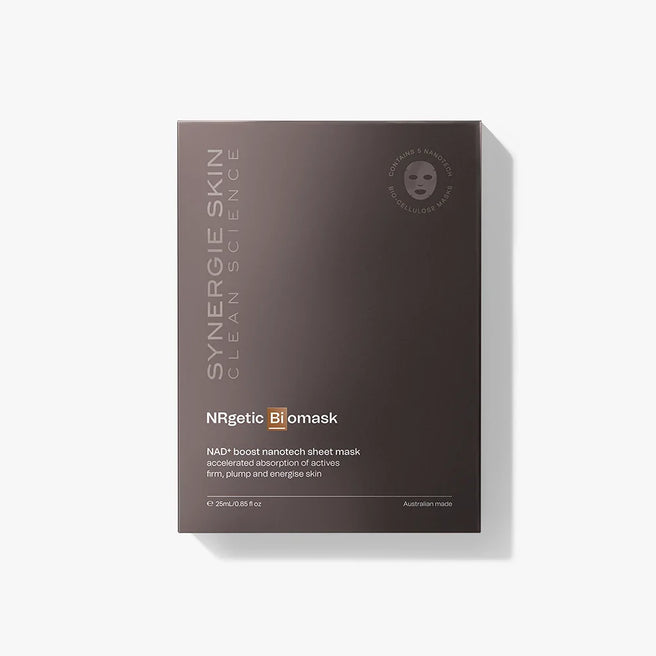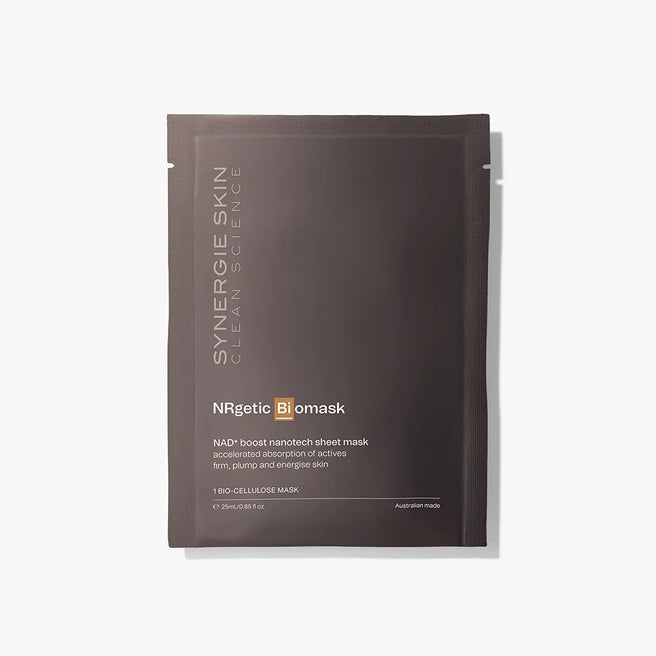Discover the Science Behind this Facial Sheet Mask Innovation
-v1724217561144.webp)
Facial masks have become a staple in modern skincare routines, offering a range of benefits from hydration to deep cleansing. However, with the myriad of options available, it can be challenging to determine which type of mask is best suited for your skin’s needs. In this blog, we will delve into the fascinating science of bio-cellulose masks, explaining what bio-cellulose is, and highlighting how these masks compare to traditional facial sheet masks. We will also answer some common questions about face masks, such as what a peel-off mask does and how often you should use one. So strap in!
What is Bio-cellulose?
Bio-cellulose is a natural fibre derived from the fermentation process of plant sources, such as coconut juice. Unlike traditional materials used in many face masks, certain types of bio-cellulose fibre, such as those used by Synergie Skin, are extremely fine – approximately 20 nanometres in diameter. This fine structure allows the mask to adhere closely to the skin, fitting perfectly into facial contours and providing a superior skincare experience. Imagine wrapping your face with a snug, breathable fabric that moulds perfectly to every curve and crevice, delivering nutrients exactly where they are needed most, much like a custom-fitted glove providing warmth and comfort to each finger. That’s nanofibre bio-cellulose in a nutshell: an extremely effective material that ensures no precious mask ingredients go to waste!
.png?v=1724218133162)
The Origins of Bio-cellulose
Bio-cellulose was initially developed for medical applications, such as wound healing, due to its high purity, strength, and ability to retain moisture. Its transition into the skincare industry was a natural progression given these properties, making it an ideal material for facial masks.
Why Choose a Bio-cellulose Sheet Mask?
Bio-cellulose sheet masks offer several advantages over traditional face masks. The fine fibres ensure that the mask adheres seamlessly to the skin, allowing for better absorption of active ingredients. This results in enhanced hydration, deeper penetration of cosmeceuticals, and improved overall skin health.
Comparing Bio-cellulose Sheet Masks with Traditional Face Masks
| Material | Composition | |
Bio-cellulose Masks | Natural Fermentation: Made from naturally derived fermented materials, such as coconut juice. | Nanofibres: Ultra-fine fibres that fit perfectly into the skin's micro-grooves |
Traditional Face Sheet Masks | Synthetic or Naturally-derived Fabrics: Typically made from cotton, paper, or synthetic materials without bio-fermentation. | Larger Fibres: Less effective at adhering to the skin's contours. |
The Benefits of Bio-cellulose
Enhanced Ingredient Penetration
Nanofibre Bio-cellulose masks allow active ingredients to penetrate deeper into the skin due to their fine structure. This results in more effective hydration and nutrient delivery.
Superior Hydration
The nanofibres in bio-cellulose masks can retain a significant amount of moisture, providing long-lasting hydration compared to traditional masks, which often offer only temporary benefits.
Skin Conformity
Bio-cellulose masks conform to the skin's surface more effectively, ensuring that every part of the face benefits from the mask’s active ingredients.
Biocompatibility with Skin
Bio-cellulose is hypoallergenic and is highly compatible with the human skin surface.
The Sustainability of Bio-cellulose
Biodegradability
Bio-cellulose masks are environmentally friendly, breaking down naturally and reducing environmental waste. This aligns with the growing demand for sustainable beauty products.
Environmental Impact of Traditional Masks
Many traditional face masks are not biodegradable and contribute to environmental pollution, making bio-cellulose a preferable option for eco-conscious buyers.
-v1724289342556.webp)
Common Questions About Face Masks
What Does a Peel-off Mask Do?
Peel-off masks are designed to adhere to the top layer of the skin and, when removed, they take with them dead skin cells, dirt, surface oil and impurities. This type of mask is beneficial for deep cleansing and can leave the skin feeling refreshed and smoother. However, peel-off masks can sometimes be harsh and stripping on sensitive skin, whereas bio-cellulose masks are gentle and hydrating without disrupting the barrier and delicate acid mantle.
How Often Should You Use a Face Mask?
The frequency of using a face mask depends on your skin type and the type of mask being used. Generally, it's recommended to use a hydrating mask, like a bio-cellulose mask, once or twice a week. For peel-off masks or more intensive treatments, once a week is usually sufficient. Overuse can lead to skin irritation, so it's important to follow the guidelines specific to each product.
The Best Bio-cellulose Mask: NRgetic Biomask
(In Synergie’s humble opinion!)
-(1)-v1724289460084.webp)
When it comes to choosing the best bio-cellulose mask, Synergie Skin’s NRgetic Biomask stands out, and for good reason. This mask combines the superior properties of nanofibre bio-cellulose using patented production methods combined with advanced skincare ingredients.
Key Ingredients in NRgetic Biomask
- Nicotinamide Riboside (NR) & Niacinamide: Boosts NAD+ levels in the skin, enhancing cellular energy and DNA repair.
- Fucoidan: A marine extract with antioxidant, collagen-stimulating, and hydrating properties.
- Dual Molecular Weight Hyaluronic Acids: Provides multi-level deep and lasting hydration.
- Tridration Complex®: Balances and binds moisture to skin cells.
The Advantage of Using NRgetic Biomask
The NRgetic Biomask not only hydrates and calms the skin but also promotes cellular vitality and longevity. Its biodegradable nature makes it an excellent choice for those who care about both their skin and the environment.
To Wrap Up
In conclusion, nanofibre bio-cellulose masks represent a significant advancement in skincare technology. Their ability to fit closely to the skin, enhance ingredient absorption, and provide lasting hydration sets them apart from traditional face masks. The NRgetic Biomask, with its innovative ingredients and sustainable materials, is an excellent example of the best bio-cellulose mask available today.
Choosing a bio-cellulose mask over a traditional one can make a noticeable difference in your skincare routine, offering both immediate and long-term benefits. So next time you’re looking to elevate your skincare game, consider reaching for a bio-cellulose mask and experience the transformative effects for yourself.





